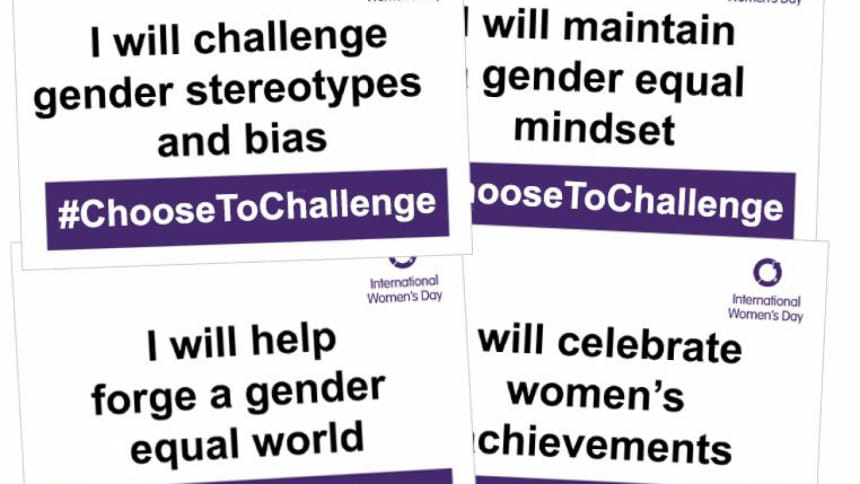#ChooseToChallenge for a Gender Equal Future

It feels hard to believe that International Women's Day (IWD) has been around for over a hundred years and achieving gender parity is still considered unattainable in our lifetimes. Once that sinks in, it becomes easy to understand why the theme for IWD 2021 is #ChooseToChallenge and why it remains important to push for change on all fronts.
Each year, I pen an article on this occasion to highlight how we can all contribute towards a more gender equal world. Taking on an issue as deep-rooted and widespread as gender inequality is understandably overwhelming. Where does one begin to address this? Can our individual voices have any impact? If gender parity is not going to be a reality any time soon, is there even a point in challenging anything? These sentiments are all valid. However, if we are persistent, even the smallest challenges to discriminatory attitudes and practices can make a difference in the long run.
Last year, we saw young people protest violence against women after the news of heinous sexual assaults and murders of women spread on social media platforms across the country. Most of these protesters were organising and engaging in activism for the first time in their lives. It is likely that it will not be the last, given the statistics. If school goers are taking to the streets, it is proof that anyone can demand change, should they choose to, and can explore various outlets to make it happen. While taking to the streets may not be possible for everyone, it is but one of the many ways to drive home changes.
The first step to taking on this issue is to educate oneself to become an informed ally. An engaged ally is an asset for any cause. Allyship promotes empathetic involvement, meaning that it is possible to align oneself to the purpose even if there is a gap in experience or understanding of the concerns. It is important for one to be actively listening and then amplifying the voices, influencing others to educate themselves, and developing a network of support.
Allyship is as active a process as the demand for change. It is necessary to first challenge oneself to identify one's own potentially harmful behaviours, unlearn them and inculcate mindset and behaviour patterns that are aligned with the cause. This process of unlearning and relearning is continuous and vital. A great place to start is by talking to the women one is closest to, practising listening, making an effort to validate their experiences and exercising empathy.
Another scope to challenge sexism and misogyny is in addressing it within one's own circles. Locker room talk has been a topic that is frequently touched upon. What makes private conversation tricky to address is that most people do not understand the wide-ranging impact it can have. A common misconception is that a simple sexist joke or misogynistic statement shared among friends does not equate to actions that reflect those notions.
However, the mere act of participating in such a thing is discriminatory behaviour. The most dangerous aspect is that it is impossible to tell who understands the limits and who doesn't. Respect for women has to be promoted in the inner circles. Getting others on board can be tough and straining. It is necessary to demonstrate patience and perseverence in involving those around us in this journey to better understand gender discrimination. One or two conversations may not do the trick but consistent dialogue can help build a network of informed allies.
There are many groups, led by young people, that are doing exemplary work in resisting, educating and organising. Kotha has excellent resources on their Facebook and Instagram that can aid in this learning process. The newly-formed Feminists Across Generations is a platform that brings seasoned activists and the future generations of activists together, providing a great way to learn what standing up for women can look like. Not Here For is a great podcast to tune into to hear directly from women what their struggles look like. Sharing resources, volunteering for causes, showing up even if its virtually, standing up in the face of discrimination – these are all choices one can make to challenge gender inequality in their day-to-day lives.
Much of this is obviously easier said than done. But it is a choice we must make if we wish to leave behind a better world than the one we are living in for the future generations. This has gone on for too long and cannot be our legacy.
Nooha Sabanta Maula is a graduate student of Social and Cultural Anthropology at KU Leuven. Send her your thoughts at [email protected]

 For all latest news, follow The Daily Star's Google News channel.
For all latest news, follow The Daily Star's Google News channel. 



Comments